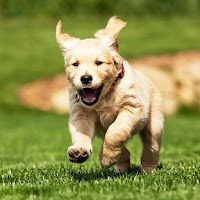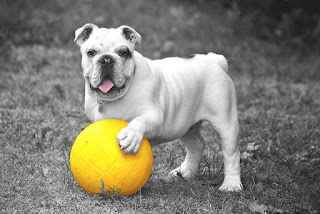Loss of the hair in the
dog: now the question is whether it is problems of
alopecia, localized, or simple changes. There is no hair loss at standard dog,
there are dogs that they lose a lot, such as German Shepherds, regularly
throughout the year, and their other colleagues who do not lose even to pay
him, by weight: poodles.
More than race, however, the hair loss in dogs depends
on the climate. Even more, the general health of the dog is one of the major
factors that influence this aspect. Even the seasons and the weather, are
connected to the hair loss in dogs and, if it's dumb "seasonal" we
talk about summer and fall, but the hair lost is soon replaced by the
new one. Those who go, they are old or damaged hair, often many dogs develop
layers of thicker coat in winter, which are then lost in the spring. This
especially for dogs living outside.
 |
| Hair Loss in dogs Credit: https://commons.wikimedia.org/wiki/File:Too-cute-doggone-it-video-playlist.jpg |
Hair Loss in dogs: Causes
That called alopecia is one of the main causes
and involves only the mantle. The loss of hair in the dog in this
case occurs only in a limited area of the body and can be a serious problem hormonal, dermatological and
psychological
Other features and other factors come into play when the hair
loss in dogs is uniform and is a completely natural phenomenon. Here we
talk about changes, in spring and autumn theory, but for dogs living in the
closed houses of the bosses, in air-conditioned in summer and heated in winter,
this stage is not a phase. The suit becomes continuous, the hair loss in
dogs no longer follows the calendar. The rhythms of the seasons we are not
in a lighted and heated apartment in an artificial way, the "mute" is
disrupted and replaced by a slow and progressive regeneration: the hair loss in
dogs occurs over the whole year and not more precise deadlines. You cannot
restore natural rhythms, it can, however, promote re-growth, also focusing on
the beauty of the coat, thanks to vitamin supplements and specific amino acids..
Hair Loss in dogs: how to Remedies it
You can act on
several fronts to limit the loss of hair in dogs, the main are
food, as often happens to us humans, for many health problems, and that
hygiene.
By acting side
"jelly", the hair loss in dogs is not cured, but a healthy
diet, meat is the most recommended because it is more digestible and often with
nutrients easier to absorb. The feed "normal" you can also tweak with
their omega-3 fats help to soothe inflamed skin of olive oil or flax seeds:
reduce dandruff and improve the overall structure of the hair.
There are special supplements of omega-3 capsules or powders that can be bought in pet shops, or they are found in foods such as salmon, tuna or other fish, and the fish's skin. According careful course that is free of bones which could splinter in the throat and cause choking.
Other useful
additions to counter hair loss in dogs are the yeast in dough, one to
dose in food every three days, while the vinegar and tea tree oil are not sticking
to the plate but by bush them , diluted in water, perfume, disinfect it and
"polish.
Even an
abundant hydration is an important factor in hair loss in dogs. In
addition to not leave never suffer from thirst our four-legged friend, you may
think to offer snacking on apple slices, bananas and cucumbers also they
contain nutrients and healthy. Other than the hair loss in dogs: smooth
and shiny coat.
Another aspect on which we can act in the home to stem the loss of hair in the dog is grooming. Since the tools. Brushes with bristles, like most human ones, are the best dog breeds to short and smooth coat, like many terriers, pugs and Greyhounds. For Retrievers, Cocker Spaniel and the St. Bernard and all their colleagues in the medium curly hair, there are the carders, with tiny dense and short metal pins. The combs are best suited for dog breeds with long hair and thick undercoat, like the Collie, German Shepherd and the Chow Chow. In general, the teeth are more or less dense depending on the quantity of coat and undercoat developed by all races and dog.
Brush aside, but essential, each his own, for the hair loss in dogs is necessary to impose the regular baths animal. This encourages the fall of the hairs: the skin of the dog hydrated seal, should not be exaggerated, however, and in winter, better wipe dry with a hair dryer, holding the cool temperature, and before dab with a cloth.
Done all this, in addition to any medications that your veterinarian has prescribed for us, if the hair of the dog continues to fall, it may be suffering from an undiagnosed illness, such as skin allergies, infections or parasites. It 'good to observe although often or constantly licks his paws or snout: the hair loss in dogs can be a sign of a bigger health problem.
 |
| Hair Loss in dogs Credit: https://pixabay.com/en/bulldog-dog-animal-pet-play-601714/ |
Hair Loss in dogs : some related diseases
Among the diseases they cause, among various or unique symptoms, hair loss in dogs, there dermatitis allergy to flea bites. It only takes a bite and the dog suffers from it begins to be prey to the crisis licking and scraping frantic, sometimes to the blood. The hair loss is often localized in the thighs or buttocks.
There is Also the ringworm, linked to the development of a microscopic fungus in the sheath of the hair: causes of the depilated areas of round form in the head, back, thighs, but rarely itching. Ringworm is a highly contagious disease to other animals, and in some cases even to humans.
The red mange (demodicosis), instead, is a mild disease usually affects the weakest animals, begins with localized hair removal but does not cause itching. Numerous skin parasites are the causes of hair loss in the secondary type dog, after severe itching. Always linked to the presence of scabies mites, Which affects in the ears, hips, elbows and thighs, and cheyletiellosis, Which causes the films and hair loss in dog.
